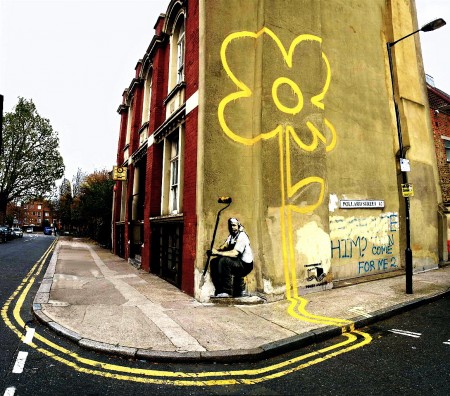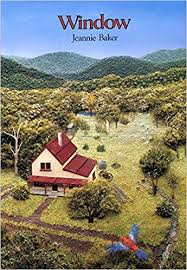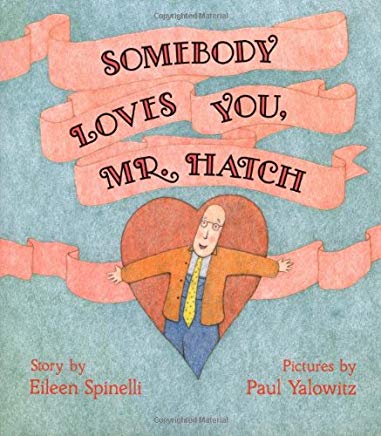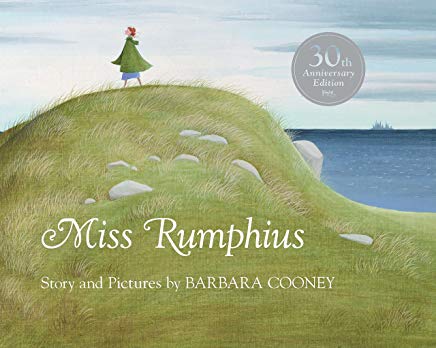The Blog
Blog Entry
Our Town

In Home, by Jeannie Baker, one girl’s window is used to keep track of an entire blossoming community, both literally (a tree planted when the girl was eight years old finally blots out the Pizza Hut sign that was one of the few remaining landmarks from the day when her family arrived) and incrementally, as each of many hundreds of unremarkable appearances and disappearances amount to a yard, a street, a riverwalk, a public garden, and several other windows that are remarkably full of life.
Time doesn’t fly through these pages. It jumps. The girl was a newborn when her parents carried her over the fissuring concrete at the beginning, and a mother reclining in a hammock by the time she has reached the back cover. A generation can seem like an awfully long time to wait for such an evolution, then sometimes we hope we’ve caught the beginnings of a very big wave, and it never happens. Still, whatever the signs of an upswing, or the causes, it’s probably not too generous to propose that we are often more than the sum of our individual contributions in such things, and any little venues we can carve from the wilderness are worth all the digging and decorating, even when we cannot see the future through the blight.
And usually we cannot. This book has no text, or verbal explications beyond a couple of stray books left by the windowsill, a growth chart, some doodles. And store signs, and billboards, and graffiti which are more than enough evidence of a neighborhood, and a life, in transition. We can quibble about the merits of gentrification (and Baker, herself, makes the opposite argument in her Window where manicured developments end up replacing a woodland, to questionable benefits), yet the view from the bedroom in Home has every appearance of a second chance, as fluky as it is inevitable, and one day likely to amount to the sort of rents that only bankers and luxury chocolate makers are able to support. We are equally masters and victims of such overreach, so the best we can probably do is remember the promising little toeholds we found to even function as a community. This does not strike me as implausible in the space of one generation. Listening, remembering a good thing, minding our elders, all that boring stuff.
Look closer. The taunting graffiti and leering, racy billboards may have faded and disappeared, and the shuttered bodega, and the wino upended on the curb, but – see! – there’s apparently the very same bus line at the finish as there was twenty-years before (alas, no hovercrafts) and that used-car dealership from the beginning is still a useful business. Here are some reminders – if we need them – of vital, timeworn ideas which have not degraded to sepia. Gee whiz, I’ve heard bicycles are even making a comeback.
I thought about all of this recently visiting my family in the country where the Internet is still delivered by phone lines, and you’d rather dash your head repeatedly against the keyboard to distract yourself from all of the seconds and minutes being depleted from your natural lifespan. But you don’t. You go to the library instead, where they have free wireless, and free computer classes, and free books. Pretty amazing when you think about it. As it happened, I was there re-reading Somebody Loves You, Mr. Hatch which you can still find around in some bookstores, usually around Valentine’s Day, though that kind of misses the point. Mr. Hatch works in a shoelace factory and generally submits to a life of quiet isolation, until a mysterious heart-shaped package arrives (mistakenly, it turns out) and he starts wearing aftershave and baking brownies and watching other people’s children and playing the harmonica – I was somewhere sufficiently engrossed in this narrative, I did not especially take notice when my laptop battery blinkered out, right while the tables around me starting filling up with a pretty unlikely cross-section of humanity.
“Are you here for Scrabble?” asked one of them, an older woman, slightly crooked, with patient, watery eyes, who was just coming into my focus.
“Oh no,” I said. “Sorry. I was just getting ready to leave.” This was overkill. I’m always worried I’m not being polite enough in the country.
“No, you don’t have to move,” said a gruff-looking guy about my age, probably a mechanic of some kind (I’m always worried I’m not handy enough in the country). “Pull up a chair,” he said, gesturing beside him. Boy, they were a motley looking bunch. Maybe lonely in their private lives. Brought together here by this thinnest common denominator. The watery-eyed lady looked like she might have even been drinking. A couple days before Christmas this was. What the heck. She seemed cheerful.
“Would you like to join us?” she asked.
“Love to,” I said vaguely, looking at my watch, folding up my computer. The library was open till eight. It had already been dark for about seven-and-a-half hours it felt like. I am a bad-ass in Scrabble, or I used to be. “But I gotta to get back to my kids.” I say things like “I gotta” a lot in the country.
“Do you by any chance remember what they were playing when the Titanic went down?” asked the lady. She’d definitely had a couple.
“Umm. Sorry. It wasn’t Scrabble, was it?” This got a big laugh.
“No, what music?” she said, nodding toward her Scrabble pals, who were already busy shuffling the face-down letters on the table between them. “We were just talking.”
Oh libraries! I thought. The guiding, brilliant spirit of them is enough to choke me up. To help me even believe in some wiser, mysterious power hovering over all of the places we may congregate – freely and unlicensed – when we are tired of escaping into ourselves. Talk about salvation. Somebody needs to start remembering libraries before they stop remembering us back.




